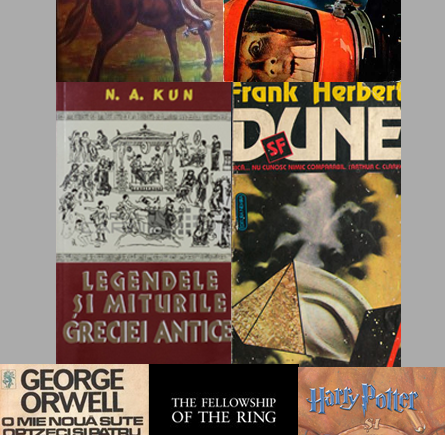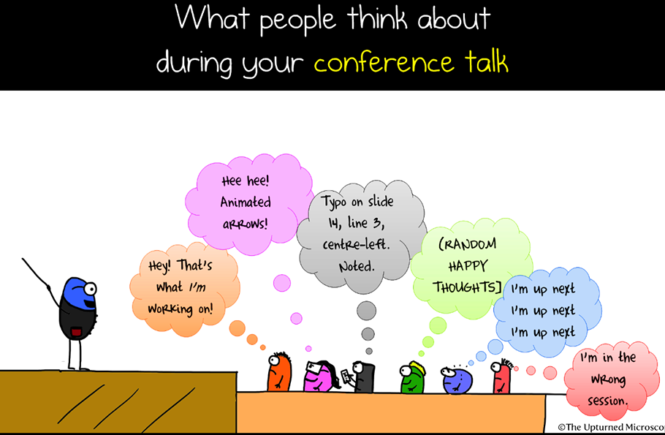published in 2015 on my tumblr
There is a meme doing rounds these days about the ten books that had the most impact on you. And I see loads of heavy stuff listed there, very serious books indeed. Stuff like Marquez and Dostoevsky and Steinbeck; and I feel utterly unqualified to add my two cents of light-hearted enjoyment of mystery, adventure and wonder. For quite a while I fought the temptation. I gave in with a sigh one evening a couple of weeks ago when I started mentally composing my list. I then wrote it down a couple of days later while waiting in an airport, in a little travel notebook I always carry around and I felt compelled to sigh again. It was however a sigh of relief this time: I was immensely grateful that no one asked me to list my favorite books. That would’ve made the task significantly harder. And I would probably still be stuck in revisions, additions to the list and rearranging of items. Instead, the meme demands ten books that made an impression and because I am never ever able to restrict myself to the number of items indicated by any meme, I cheated my way out as usual. Though the list is numbered 1 through 10, some numbers list more than one book. In my defense, the list is almost chronological.
- Bertoldo, Bertoldino & Cacasseno (Giulio Cesare Croce). These are Italian tales featuring a prankster/trickster peasant arriving at the Court of a Medieval King, getting by on wit, cleverness and common sense until succumbing to a broken heart. It is the first book I ever remember. My father used to read it to me when I was very little, with a wonderful intonation and doing voices when coming to dialogue bits. Along withThe Adventures of Dunno and His Friends (Nikolai Nosov) and a book about a family of mice roughly translated as Family Nibblelot (Florian Cristescu) which were both read to me by my mother (and I under no circumstances accepted that one should read aloud from the book of the other), it forms the trilogy of books from my pre-school years that convinced me for life that books hide marvelous universes between their covers.
- Winnetou (Karl May) // The Naked Sun (Isaac Asimov). I know this sounds like a highly unlikely pairing, but these were the precise two books I ever picked up and read on my own, in exactly this order. I was six or seven and preparing for a long holiday trip. I could by now reach several of the many bookshelves in our home and spent quite some time literally judging books by their covers (or rather, spines), trying to pick one for the road. I ended up with volume 5 of Winnetou, because I had no clue what the five stars next to the title meant. Or I assumed something along the lines of ‘the more stars, the better’. The beginning confused me, then the book gripped me and in a way, it never let go, not even when the very first book I read on my own also broke my heart for the very first time, since the namesake character dies at the end of volume 5. I was inconsolable for a while, until I learned what volumes are and that you are supposed to read them in the proper order, which I have since done for around ten times or so. In hindsight (and obvious Christian values blabber in the books aside), it probably shaped much of my ideas about what heroes are or should be like (as did all other Karl May books which I devoured in the years to come, while my parents dutifully and gladly provided everything that was being translated and published in the early 90s book-boom around here). Also, it did the trick. It got me hooked on books so I was once again looking puzzled at the bookshelves, still not quite sure how to pick one to read so I went by the title for my next one and got plunged headfirst into science-fiction. Another journey I never quite returned from. The Naked Sun had just about enough suspense, murder mystery, robots and intriguing ideas in it to make me declare at that tender age that no genre quite compares to sci-fi and may I please have another.
- The Legends and Myths of Ancient Greece (N.A. Kun). Having already escaped into the Wild West and into the distant future, a neat book with plain brown hard covers and glossy white pages lured me into heroic adventures of the past. The classic Greek myths were brilliantly retold and accompanied by illustrations of frescos and urns and vases and obviously meant to be read and re-read. The book made me learn the Greek pantheon by heart and prompted a life-long fascination with mythology of all sorts (and made sure it spoiled several blockbusters for me and all those unfortunate enough to sit around me at the cinema).
- Dune (Frank Herbert). Approaching mid-nineties, a publisher called Nemira was heavily translating the giants of science fiction literature in a collection called Nautilus. Though for some strange reason I have never liked Jules Verne, I very much liked this incarnation of his submarine. Dune quickly became a favorite of mine, I secretly wanted to be Paul Atreides, or at least as smart as Thufir or as good with swords as Duncan. Asimov might have made me fall in love with science-fiction, but it was Herbert who made sure I was dumbstruck with awe about it. Dune and the God-Emperor of Dune are still my favorites in the series and I think it might be a good time to maybe re-read it for the… I am not sure, sixth time maybe?
- 1984 (George Orwell). While adventures and expanding/ed universes filled my childhood and teenage years, I was very much yanked back and down to Earth in my first year at the uni, when I read 1984 in the breaks between lectures. I knew quite well what the book was about before starting it and I had quite clear memories of six years of life in a society not very much unlike the one Orwell depicted. I had seen the cartoon version of Animal Farm when I was eight and vowed never to read the book because it left me bawling my heart out and yelling at the TV “Don’t kill the horse, you bastards, don’t kill the horse!”. Neither the book synopsis, nor that had however prepared me for 1984 and I am pretty sure a small part of me died when I finished it and I have probably never viewed humanity with quite the same eyes. I knew deep inside that there’s a breaking point for everyone, that noble heroes are the stuff of legends and books and movies. I rationally knew that behind every martyr that stood up for an ideal, there were thousands who broke and I knew that behind any defiant last words were the smell of shit and piss and dried blood and the howls of pain, the swishes of whips and breaking of bones and sizzling of fires and quiet sobs of despair – but that was never said out loud, never depicted for any other reason than to emphasize the triumph of human spirit at the end. 1984 managed to wipe aside all that décor and break me a little inside though for many years I clung to a minor detail of the book to pick myself off the ground.
- The Lord of the Rings (J.R.R. Tolkien). It was shortly thereafter that literature redeemed itself and my fondest memories of my first boyfriend are actually him lending me The Exorcist and The Lord of the Rings. It was late one warm autumn night when somehow I brought up this trailer of a new movie that would be coming out in December and how fun sci-fi is but how it is somehow more fun when it’s… well, a bit Medieval. So that night I learned what fantasy is and the second day I got The Fellowship of the Ring on loan (along with a lot of warnings against stains on the book or dog-eared pages). I finished the trilogy before December came and since my mother asked what I wanted, she gifted me my own edition for Christmas. And here I was, succumbing to the epic once more.
- Harry Potter (J.K. Rowling). I have started reading Harry Potter very late and after overcoming a lot of my own prejudice. I hold a very misogynistic point of view that there are few women who know how to write and almost none in sci-fi and/or fantasy. I loved Marion Zimmer Bradley’s Avalon series and a couple of other novels but there are some rather disturbing aspects to her writing. Margaret Weiss maybe, though what I’ve read of hers was collaborative work with Tracy Hickman and I hold the notion that he kept the bothersome aspects in check. Even Robin Hobb’s Assassin slides down a dangerous female-ish path with thoughts attributed to the main character that I seriously doubt any male has. I was recommended Ursula K. LeGuin but haven’t managed to read anything of hers so far and I am not really into vampires so I’ve never really tried Anne Rice (though she does have a fluid story telling style). In short, my issue was I had never read a woman that could write (especially fantasy or science fiction) like a man: fluid, entertaining and to the point, without going over the top pushing the tear jerking buttons; over all, guys’ female characters were more to my taste than gals’ male characters (though a dungeon mastering acquaintance of mine said he’d rather trust a girl to play a male character than the other way around). It might be my own twisted way of thinking, but that is that. Or at least, it was until Harry Potter. Because the novel flows, the writing fits and I haven’t sensed any of the usual things that bother me. I fell head over heels after the first couple of chapters and I have re-read the books a couple of times. I still find the entire story enjoyable at that primary childhood level, while I could also point out parallels and allegories that would be good topics for social science classes.
- Forty Rules of Love (Elif Shafak) This is not my favorite book of Shafak’s (that would be The Saint of Incipient Insanities so far), but it was the first book of hers that I have read. I have picked it up almost by accident in a bookstore. I had bought something entirely different and on my way to the cashier I noticed this one, found it has alternating timelines set in present day New York and Rumi’s Persia and decided I want to read it. I loved it and I was glad to have found in Shafak a female writer I could thoroughly enjoy, who was willing to take on a multitude of topics and who managed to write a book like a vivisection.
- The Hitchhiker’s Guide to the Galaxy (Douglas Adams). There are two things that two different people have tried for years to convince me of and I refused out of sheer stubbornness. One person has bugged me for around two years to watch Doctor Who. The other for around just as long to read the Hitchhiker’s Guide to the Galaxy. In the end, I gave in to both, determined to prove them wrong in their assumptions about my tastes. I eventually proved them both right. I have since watched all Doctor Who episodes and am waiting on the edge of my seat every Saturday. And I have since read the Hitchhiker’s Guide around three times, ending up making pop culture references about it and shoving it in the face of random people, urging them not to panic. But it is not only the love I have for the book or the pure joy and mad snickering that reading it gives me every time that made it land on the list. It is the fact that I absolutely adore Douglas Adams’ writing style. So much that I only recently became aware that on some subconscious level I am probably trying (and miserably failing, because I am no word-kneading or –knitting genius) to emulate it. If that doesn’t count as impact, I don’t know what does.
- American Gods (Neil Gaiman). I have picked up American Gods because I read a positive review on a blog I follow, whose owner had proved to have tastes similar to mine. I breezed through it and I was left wanting for more (and didn’t it fit in nicely with my early love for mythology?). Neil Gaiman is a Storyteller with a capital S, which is about as revered a person as one can get in my mind. I have since pretty much read everything of his I could get my hands on and I quite plan on carrying the Sandman collection to Germany with me for a re-read. It may be Douglas Adams’ writing style that I unwittingly try to imitate, but it is Neil Gaiman who I want to become when I grow up – as a writer and as a person. A friend of mine calls him “my little obsession” and it is a phase that has been going on for quite some time now, so… there you go, impact.




